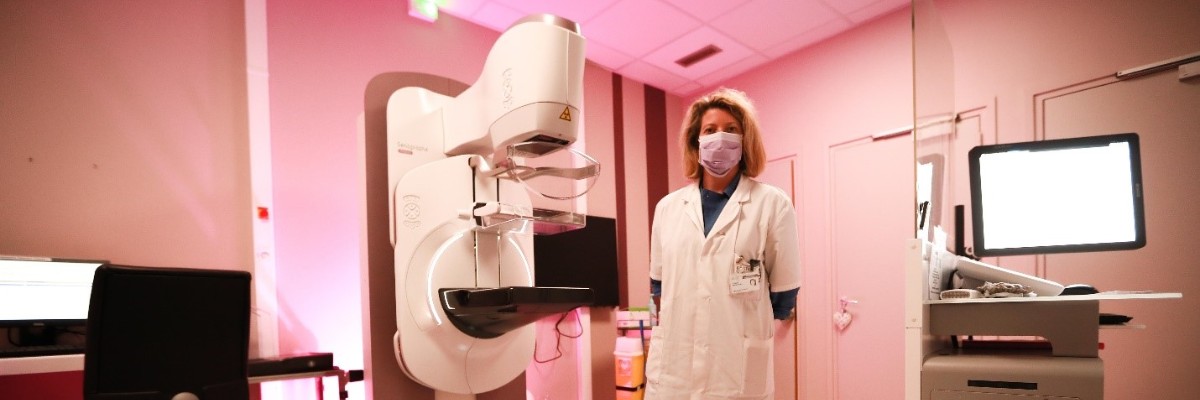Breast cancer doesn't care that a global pandemic has caused delays in timely screenings and diagnoses.
Most women understand that breast cancer screenings have saved thousands of lives. Still, one in four1 avoids screening because it can be uncomfortable, or because they're anxious about what the results might ultimately reveal. Those factors definitely present a challenge, since research shows earlier detection leads to increased survival rates.
Anxiety can also build when women have to wait for screening mammogram results, according to a February 2019 study in the Journal of the American College of Radiology. In some locations around the globe, waits may extend to several weeks.
That's the situation when things are "normal." In March, the advent of COVID-19 prompted leaders in the field of breast cancer prevention to suggest that healthy women with average risk postpone their screenings until later this year. Additionally, many imaging centers didn't offer routine screenings due to restrictions imposed around the pandemic, coupled with extraordinarily high demands on healthcare systems that caused the postponement of elective procedures.
Now, there's encouraging news. In a July 17 update, Epic Health Research Network reported cancer screenings are rising again from pre-COVID-19 levels, but recent weekly levels for breast cancer--29 percent--are still lower than pre-pandemic. That report also revealed that between March 15 and June 26, a total of 285,000 breast cancer exams were missed.
Comprehensive Breast Care in One Day
In order to address this deficit, clinicians will need innovative, patient-centric models of care that reduce anxiety around the screenings and improve the speed at which patients can be diagnosed.
One such model exists at the One-Stop Clinic at the Gustave Roussy Cancer Campus in Villejuif, France, the leading European cancer center with an impressive 70-year history of care. Launched in 2004, the clinic has positively redesigned the breast diagnosis experience, leading to a second clinic opened in 2019 in Medellín, Colombia.
The innovative, yet totally common sense idea is that women go to one place, interface with one interdisciplinary team—including an oncologist, a radiologist, and a surgeon—and do it all in one day. The clinic staff guides patients on a comprehensive and smoothly-coordinated journey from appointment to diagnosis and if necessary, to treatment.
In France alone, tens of thousands of women postponed mammograms, which led to potentially thousands of missed cancer diagnoses. For women who had no symptoms and weren't deemed to be at risk, screening could be delayed for three to six months, says Dr. Corinne Balleyguier, head of medical imaging at Gustave Roussy.
Dr. Balleyguier knows that uncertainty creates anxiety, and so the goal at the clinic is to minimize both. She and her fellow physicians, including Dr. Suzette Delaloge, associate professor of medical oncology and head of the breast cancer department at the center, developed the understandably popular one-stop concept.
Access to the Latest Technological Advances
Women can refer themselves if they suspect something's wrong, but usually, their family physician or gynecologist refer after an abnormal mammogram, says Dr. Balleyguier. That can include an abnormality in BI-RAD categories 3, 4, or 5, a palpable mass, nipple discharge, or skin reflection.
At Gustave Roussy, patients take advantage of advanced GE Healthcare technology including the Senographe Pristina™ which allows women to manage their own mammogram compression with a patient-operated remote control for more comfort and less anxiety. The goal is to produce the best image quality with the lowest dose of radiation, she says.
Comfort matters, so Pristina features a carbon-fiber breast examination tray without customary sharp angles and a design to reduce muscle tension that might compromise image quality.
Patients also have access to state-of-the-art diagnostics such as SenoClaire™ 3D breast tomosynthesis mammography, to SenoBright™ contrast-enhanced spectral mammography, and to ultrasound and stereotactic biopsy.
The Paris clinic sees between 20 and 30 women a day, while Colombia's clinic usually sees 15. For a very high percentage of women, false positives or callbacks aren't an issue, as findings are addressed immediately when time is of the essence.
"The clinics have worked very well," says Dr. Delaloge. "Patient satisfaction is very high."
In October 2019, GE Healthcare and Premiere Inc. announced a partnership to bring a same-day cancer diagnosis and treatment model to the United States. Clearly, it's an idea whose time has come.2





